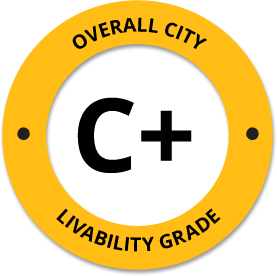Flint Hill's Livability

-
B+
Affordability -
B
Housing -
B
Job Market -
C
Diversity -
B-
Crime -
B
Commute -
D+
Education -
B
Weather -
D-
Amenities
About Flint Hill, NC
Flint Hill, NC is located in Randolph County in the state of North Carolina.
The total City Population for Flint Hill is about 8,132 with about 106 people per square mile.
The Average Home Value is $115,000, which is roughly 37% lower than the Average Home Value of $182,702 for the state of North Carolina, and roughly 47% lower than the National Average of $217,072.
The Median Income Per Household is about $44,085, which is roughly 23% lower than the Average Median Income Per Household of $57,244 for the state of North Carolina, and roughly 32% lower higher than the National Average of $65,026.
Quick Stats
Demographic Details
Average # of People Per Household: 2.42Male Population Estimate: 46.8%
Female Population Estimate: 53.2%
Median Age: 40.4
Male Median Age: 39.6
Female Median Age: 40.9
Racial Demographic Estimates
Black:18.8%
Hispanic:5.7%
Other:3.4%
Asian:1.7%
Indian:0.8%
Hawaiian:0%
Voting



Voting Results by Party
Democratic: 21.3%
Libertarian: 0.69%
Other: 0.24%
Green: 0.17%
Crime Details
NOTE: Crime is available at the County level so this doesn't necessarily represent the city of Flint Hill specifically.
Average # of Homicides for Randolph County: About 5.72005 per 100,000 People
(last recorded in 2020)
Average # of Violent Crimes for Randolph County: About 237.364 per 100,000 People
(last recorded in 2021)
Randolph County is about 31% higher than the national average of about 4 homicides per 100,000 people, and about 18% lower than the national average of about 288 violent crimes per 100,000 people.
Employment
North Carolina is ranked #52 out of 52 for Best and Worst States to Work in America, with an overall score of 6.19 out of 100.

Wage Policies
Overall Wage Policy Score: 5.06The average living wage for the state of North Carolina is $31.26/hr, while the states minimum wage is $7.25/hr, which can be set above the state standard, and is extended to farm workers. This gives North Carolina a minimum wage score of 6.97 compared to all other states.
The minimum wage for tipped employees is $2.13/hr, which gives North Carolina a minimum wage for tipped employees score of 8.97 compared to all other states.
The weekly unemployment (UI) benefit for North Carolina is $145.00, resulting in a UI benefit score of 5.29 compared to all other states.
Worker Protection Policies
Overall Worker Protection Score: 71.43X North Carolina does offer protections for workplace breastfeeding.
✓ North Carolina does mandate equal pay across gender and race.
X North Carolina does prohibit pay secrecy practices in the workplace.
X North Carolina does restrict access to salary history to reduce gender and racial bias.
X North Carolina does provide some form of paid family leave.
X North Carolina does provide some form of paid sick leave.
X North Carolina does not provide flexible scheduling of worker shifts.
X North Carolina does not mandate pay reporting or "call-in" pay by employers.
X North Carolina does not provide split shift pay regulation.
X North Carolina does not provide workers advanced notice of shift scheduling.
X North Carolina does provide some form of sexual harassment protection in state law.
✓ North Carolina does extend workers compensation mandates to farmworkers.
X North Carolina does not extend worker protections to domestic workers.
Right To Organize Policies
Overall Right To Organize Score: 70X North Carolina does legalize project labor agreements to ensure a fair wage to workers on contract.
X North Carolina does not protect workers against wage theft retaliation.
X North Carolina does partially require collective bargaining for public workers.
X North Carolina does provide collective bargaining for teachers.
X North Carolina does provide wage negotiations for teachers.
A global organization that fights inequality to end poverty and injustice.
Nearby Location
- Sophia, NC ( 3.81 mi. )
- Glenola, NC ( 4.93 mi. )
- Randleman, NC ( 6.63 mi. )
- Trinity, NC ( 7.00 mi. )
- Archdale, NC ( 7.28 mi. )
- Asheboro, NC ( 8.59 mi. )
- Allen Jay, NC ( 8.75 mi. )
- Level Cross, NC ( 8.85 mi. )
- Millboro, NC ( 9.83 mi. )
- Thomasville, NC ( 10.37 mi. )
- Erwin Heights, NC ( 10.83 mi. )
- Gordontown, NC ( 10.85 mi. )
- Silver Valley, NC ( 11.13 mi. )
- Cedar Falls, NC ( 11.30 mi. )
- Freemans Mills, NC ( 11.37 mi. )
- H P, NC ( 11.37 mi. )
- High Pnt, NC ( 11.37 mi. )
- Cid, NC ( 11.97 mi. )
- High Point University, NC ( 12.21 mi. )
- Emerywood, NC ( 12.46 mi. )
- Grays Chapel, NC ( 12.65 mi. )
- Pleasant Gdn, NC ( 13.07 mi. )
- Pleasant Gdns, NC ( 13.07 mi. )
- Jamestown, NC ( 13.59 mi. )
- High Point, NC ( 13.64 mi. )
- Franklinville, NC ( 13.76 mi. )
- Climax, NC ( 13.85 mi. )
- Pleasant Garden, NC ( 14.22 mi. )
- Groomtown, NC ( 14.40 mi. )
- Hilltop, NC ( 14.40 mi. )
- Hedrick Grove, NC ( 14.47 mi. )
- Sedgefield, NC ( 14.79 mi. )
- Holly Grove, NC ( 15.03 mi. )
- Denton, NC ( 15.43 mi. )
- Jacksons Creek, NC ( 15.46 mi. )
- New Hope Academy, NC ( 15.46 mi. )
- Ramseur, NC ( 15.73 mi. )
- Hannersville, NC ( 15.76 mi. )
- Lex, NC ( 15.76 mi. )
- Reeds Cross Roads, NC ( 15.76 mi. )
- South Lexington, NC ( 15.76 mi. )
- South Greensboro, NC ( 15.91 mi. )
- Spring Valley, NC ( 15.91 mi. )
- Deep River, NC ( 15.98 mi. )
- Julian, NC ( 16.37 mi. )
- Vandalia, NC ( 16.96 mi. )
- Greensboro NDC, NC ( 17.13 mi. )
- Forest Oaks, NC ( 17.68 mi. )
- Handy, NC ( 17.76 mi. )
Additional Location Details
Zip Code(s): 27350Latitude: 35.801800
Longitude: -79.923600
TimeZone: Eastern (GMT -05:00)
Daylight Saving: Yes
Region: South
Average Elevation: 784.0 ft.
Area Code(s): 910